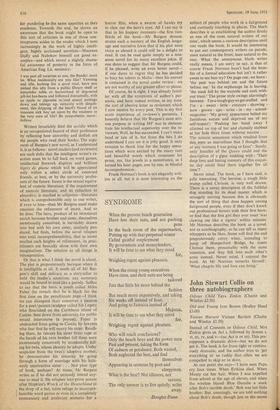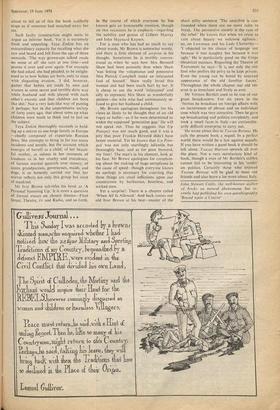John Stewart Collis on three autobiographers
Tuscan Harvest Vernon Bartlett (Chatto and Windus £1.50) Instead of Contents to Odious Child, Mrs Zinkin gives us Act 1, followed by Scenes t, ill, iv, and v—(no Act it or in). This pre- supposes a dramatic drive—but we do not get it. The book is far from tight or continu- ously dramatic, and the author tries to 'get everything in' so rashly that often we are compelled to skip or to skim.
At one point she says-1 have seen Papa cry four times. When Erskine died. When Mouty cut her hair. When I was expelled from school at the age of eleven, and when the wireless blared Blue Danube a week after Bob's terrible death.' Bob was her little brother. But, amazingly, we are told nothing about Bob's death, though just as she seems
about to tell us of this the book suddenly stops as if someone had snatched away her Ms.
Such faulty construction might seem to argue an inferior book. Yet it is extremely fresh and appealing. Taya Zinkin has an extraordinary capacity for recalling what she saw and heard and felt from the age of three onwards. 'The way grown-ups talked made no sense at all' she says at one time—and proves it over and over again. For example she had asked, she had pleaded, to be enlight- ened as to how babies are born, only to meet with disgusting evasion. '1 did, however, gather that babies are made by men and women in some secret and terribly dirty way while husband and wife played with each other's excreta and that children are born like shit.' Not a very lady-like way of putting it perhaps; but in the tinpermissive society of forty years ago, that about sums up what children were made to think and to feel on the subject.
Taya Zinkin thoroughly succeeds in hold- ing up a mirror to one large family in Europe —chiefly composed of expatriate Russian Jews. She attempts to bring in far too many incidents and people, but the account which emerges of herself as a child; of her beauti- ful mother, as odious in her moments of kindness as in her cruelty and truculence; of furious marital quarrels over money; of aunts, grandparents, governesses, maids, and dogs, is so honestly carried out that her mirror reflects not only this group but most of mankind.
Mr Ivor Brown sub-titles his book as 'A Personal Summing Up.' It is more a question of formal essays on chosen themes—Fleet Street, Theatre, Tv and Radio, and so forth, in the course of which everyone he has known gets an honourable mention, though on two occasions he is emphatic—regarding the nobility and genius of Gilbert Murray and John Maynard Keynes.
For a man who has had so much to say about words, Mr Brown is somewhat wordy, and there is little clement of surprise in his thought. Sometimes he is terribly conven- tional as when he says how Mrs Bernard Shaw had been patiently firm when Shaw 'was letting the voluptuous and possessive Mrs Patrick Campbell make an infatuated fool of himself.' Shaw really loved this woman and had been much hurt by her. It is cheap to use the word 'infatuated' and silly to represent Mrs Shaw as wonderfully patient—the wife who had continuously re- fused to give her husband a child.
Mr Brown apologises throughout for his views as likely to be thought that of an old fogey or buffer—as if he were determined to widen the supposed 'generation gap.' He will not speak out. Thus he suggests that Up Pompeii was not much good, and it was a pity that poor Frankie Howerd didn't have better material. Yet he knows that Up Pom- peii was not only startlingly infantile but thoroughly base; and as for poor Howerd, my foot! The man's in his element, look at his face. Mr Brown apologises for complain- ing about the making of huge aeroplanes in the cause of speed—though everyone knows no apology is necessary for asserting that these things are cruel inflictions upon our countrymen by barbarous, heartless, and wicked men.
Yet a surprise! There is a chapter called 'When Allis Allowed.' And back conies our old Ivor Brown at his best—master of the short pithy sentence. The anarchist is con- founded when there are no more rules to break. The permissive society is the ruin of the rebel.' He knows that when we cease to care about beauty we welcome ugliness: so, on Lawrence and his Lady Chatterley-- '1 objected to his choice of language not because it was naughty but because it was ugly.' He is particularly good on the tinge theatrical maniacs. Regarding the Theatre of Excrement he says—'It is not only the old fool who prefers the privy to be kept private. Even the young can be bored by renewed appearance of the old familiar faeces.' Throughout the whole chapter our old vet- eran is as trenchant and lively as ever.
Mr Vernon Bartlett used to be one of our great broadcasters. For six years in the 'thirties he broadcast on foreign affairs with an incisiveness of phrase and an individual tone which was very attractive. Then he gave up broadcasting and politics•completely, and took a small farm in Italy—an extraordin- arily difficult enterprise to carry out.
He wrote about this in Tuscan Retreat. He calls the present book a sequel. In a perfect world there would be a law against sequels. If you have written a good book it should be left alone. Tuscan Harvest sprawls all over the place. Not a very satisfactory kind of book, though a man of Mr Bartlett's calibre cannot fail to be interesting in his 'asides' on politics. Certainly those who enjoyed Tuscan Retreat will be glad to meet old friends and also learn a lot more about Italy.
John Stewart Collis. the well-known author of books on natural phenomena, has re- cently had published his own autobiography 'Bound upon a Course'



































 Previous page
Previous page